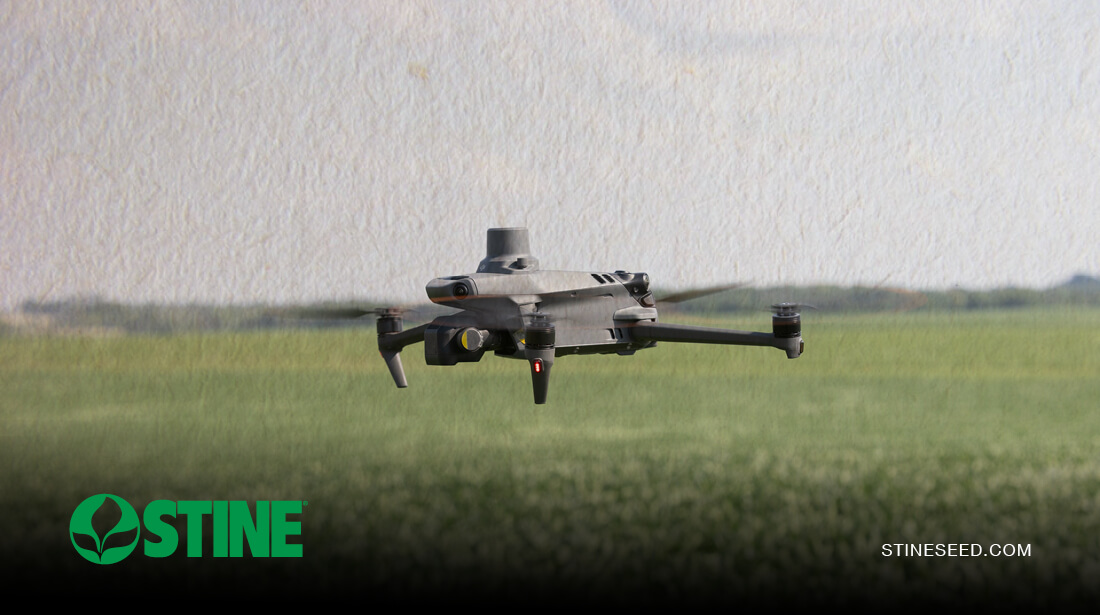Adel, Iowa, USA
March 27, 2025
Artificial intelligence (AI) — including machine learning — will soon transform the agriculture industry, offering new ways to improve productivity and decision-making. As the industry continues to explore how to harness data and automation, one thing is clear: The future of farming will be shaped by those who successfully integrate technology while staying true to agriculture’s time-honored principles.

To help farmers gain insights into how these technologies will shape modern farming, Stine® Seed Company Research Scientist Ben Aldrich shares his perspective on the opportunities and challenges AI presents in agriculture.
Revolutionizing farming with data-driven decisions
One of the most promising applications of AI in agriculture is processing massive amounts of data efficiently. For example, machine learning algorithms can analyze variables like soil health, weather patterns and crop performance to make real-time decisions, helping farmers fine-tune planting strategies and predict yields more accurately.
“Machine learning is becoming crucial for processing and interpreting vast amounts of data. Growers will be using data-driven insights to make decisions that were previously based on intuition or limited information.”
Ben Aldrich, Stine Seed Company research scientist
According to Aldrich, AI-driven precision agriculture tools will become invaluable for growers looking to increase efficiency while reducing input costs. From drone imagery that maps crop health to automated systems that monitor soil moisture, the integration of AI is streamlining farm operations in unprecedented ways.
While the potential is vast, Aldrich cautions that successful AI adoption requires overcoming challenges related to data quality and accuracy. Agricultural data comes from various sources, such as drones, sensors and satellite imagery, making it essential to validate and standardize inputs to avoid misleading results. Additionally, the lack of high-quality data in some rural areas can limit the effectiveness of machine learning models.
“The technology is only as good as the data feeding into it,” he notes.
There are also ethical concerns to consider, particularly for data privacy. Farmers need to feel confident that their data is used responsibly and transparently. Building trust through clear communication and robust data protection practices is crucial for fostering wider adoption of AI.
As AI continues to evolve, its role in farming will expand, but technology alone isn't the answer. While AI is a powerful tool, it works best when paired with human insight to ensure practical and effective application.
Enhancing human expertise with technology
Aldrich emphasizes that while AI holds great potential, it should not replace human proficiency. Agronomists and farmers bring invaluable wisdom that technology alone cannot replicate.
“Technology can enhance our decision-making, but it can’t replace years of field experience and local knowledge,” Aldrich explains.
Instead, AI serves as a supportive tool that complements the work of agronomists and farmers. For example, using machine learning to analyze pest and disease risks allows for preventive action without solely relying on automated solutions.
The future of AI in agriculture isn’t about replacing people — it’s about equipping them with better tools to work smarter. As these technologies evolve, their role will be to enhance the intuition and expertise that growers have relied on for generations.
Looking ahead: The future of AI in agriculture
Aldrich believes that as AI becomes more accessible through low-code and no-code solutions, even smaller farming operations will benefit. Simplifying the adoption process will help bridge the gap between advanced technology and traditional farming practices, empowering more growers to embrace innovation without sacrificing their hands-on approach. However, thoughtful implementation and farmer-centric solutions are key to realizing these advantages.
"The goal is to use technology as an ally to the farmer, not a replacement. It’s about making smarter decisions that lead to better outcomes while still valuing the human element that makes agriculture unique.”
Ben Aldrich, Stine Seed Company research scientist
For more agronomic insights, visit StineSeed.com or connect with your local Stine sales representative. Listen to the latest episode of the “Stine Seedcast,” where Aldrich discusses AI and machine learning in more detail.